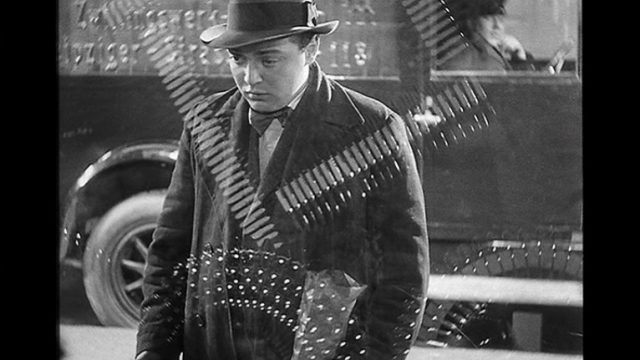1931 was an unpleasant time in Germany. Fritz Lang knew it. So did Peter Lorre. I’m not going to go through the entire uncredited cast, but of the credited cast members, yes, there is a Holocaust victim. Georg John, who played the blind beggar, died in the Lódz Ghetto. Lorre and Lang both fled Germany, and they are not the only ones who did not die in their native land. Though admittedly, Lorre couldn’t, as he was born in Austria-Hungary, which didn’t exist anymore.
A child-murderer is stalking the streets of Berlin. Young Elsie Beckmann (Inge Landgut) is taken, the balloon her murderer bought her no comfort to her now. Through dogged investigation, the police hope to find him. They search the criminal underworld, raiding brothels and underground clubs, hoping to find the man they seek. The local criminal bosses, however, dislike that all this is cutting into their profits. It’s hard to do business with the police breathing down their necks. So they decide they will find the murderer themselves.
Yes, the film is yet another place where a distrust of an insanity plea is expressed. Though Lorre’s tortured Hans Beckert is given a defender in the trial the criminals set up, played ably by Rudolf Blümner, his argument that Beckert cannot form criminal intent is unpersuasive to the “jury.” The defender makes it clear that he, too, finds Beckert’s crimes abhorrent, that he finds Beckert repulsive. However, he still finds Beckert blameless on a deeper level, as Beckert does not wish to commit these crimes and frankly finds himself pretty repulsive, too. I believe the argument is intended to sway us, and I believe Lang’s ending suggests that he is aware that it in many case will not, even though culpability is deeper than that.
With the Nazis in power, it is easy to believe that Lang was drawing deliberate parallels, for all he said he was not. And of course, there is likely to be debate for a very long time about whether Thea von Harbou, his cowriter and then-wife, would have had anything bad to say about the Nazis at the time. However, I don’t think the film works as a straight allegory, because I don’t think lang believed that none of the Nazis were responsible for their own actions. Of course, I have the benefit of many decades of hindsight, here, but I think the real horror of Nazism is that many of the people who were part of the system could have helped themselves if they’d wanted to.
This film marked one of several turning points in the career of Peter Lorre. Before M, he was primarily known as a comedic actor. I suspect this is in part because he is funny-looking in a Buscemi sort of way. M was Lang’s first sound film. It wasn’t Lorre’s—it was his third film, and he never made a silent one—but it was still early days, and acting for the screen is a different skill than acting for the stage. So, then; the monologue Lorre delivers as Beckert explains the hideous nature of who he is was not performed in a way that would have completely fit in either stage acting or silent movie acting; this is the movie that made Lorre a name. He would, when he escaped to Hollywood, end up as Mr. Moto a lot, but today, I think he is more remembered for the chills.
Naturally, the Nazis used that monologue as an example of the vile nature of the Jews; is that a surprise to anyone? And indeed, Lorre was Jewish. Lang was half-Jewish. There were several Jews involved in the making of the film, yes. But the scene wasn’t used as an example of writing or acting or anything like that; the implication was that Lorre actually was that person. Ludicrous, of course. I can only assume this was after Lorre’s escape and possibly tied to it; the real proof that he was evil was doubtless that he wouldn’t stay in Germany to be killed.
If Beckert were freed, that would indeed be an indictment of any system that would do it. There is no reason to assume that his impulses can be cured and much reason to consider it too much of a risk to take. This is a man acting under a compulsion he does not understand and does not want to cooperate with, yet he kills anyway. You don’t let that guy roam free. But his defender is not wrong when he declares that Beckert is not responsible for his acts. That’s how compulsion works. Beckert’s madness may be one of the greatest horrors captured on film. It is horrific for the victims’ mothers, of course, and it can’t have been all that dandy for the victims, either. But Beckert’s loss of control over his own mind is terrifying to me on a level I’m not sure I can explain.
It doesn’t hurt that Lorre sells it, of course. Though relatively little of the movie shows him onscreen, it’s easy to forget that. Which is a shame, because that means forgetting things like the clever scene where a police meeting and a criminal meeting are spliced together, which is a nifty bit of filmmaking. Lorre is amazing, but Lang deserves no little of the credit. And luckily for him, unlike Lorre, he didn’t end up burdened by typecasting because of it.


